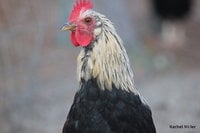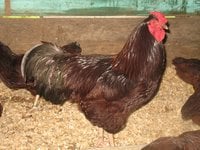I've been raising and keeping Icelandic chickens for about a year and a half, now. I was first drawn to the breed by the diversity of the feather colors present, as well as its proclaimed hardiness. Over all, I have been delighted with the breed. I currently live in a large city environment, but am looking to move to a much more rural area within the next year or two. So, I wanted birds that were good foragers, keen to predator danger, and decent egg layers.
Foraging/feeding habits:
My birds are very good at feeding themselves. If there is something edible where they range, they will find it and rarely let food go to waste, if ever. I have seen them eat everything from the ornamental berries around our yard, to numerous bugs, to somewhat-fermented feed leftovers dumped out of other chicken pens. They are also appreciative of any food scraps you may give them. I feed mine whole or cracked grains daily, but also give them stale (non-sugary) cereals, old popcorn, vegetable and/or fruit scraps, bread scraps, etc. They'll take it all.
Temperament and personality:
My birds are generally agreeable in temperament. Once in a while you'll get a mean bird, but I think the same can be said of any breed. The hens have no problem coming near people that they know, but they will avoid strangers like the plague. Some individuals may be picked up and held or carried around; others do not want to be touched. If they are not handled frequently, they will turn somewhat feral and will avoid human contact. They are only mildly competitive and get along with most other large fowl in a flock, but they do get picked on some because of their smaller size. The roosters are good at finding food for their hens and are very tolerant of chicks coming around them; if raised together, males won't usually fight each other. Unfortunately, I have not yet had any hens go broody, so I cannot say what kind of mothers they make.
Laying:
When my hens started laying, I had a pair of sisters who both began at about 5 months of age. My other hen didn't start until she was 8 months old, so it can vary from hen to hen. They are fairly good layers and I have been surprised at the size of their eggs, for how small the birds are. The average size of egg that I collect from mine are probably considered a medium, with some large eggs interspersed here and there. My hens each lay about five eggs a week. I would raise caution, though, that if you free range your flock, you can count on hunting a lot for any Icelandic eggs you may be getting. My girls will lay in the nest box, but given half the chance, they will scout out other "more suitable" nesting locations and stash their eggs there. I attribute this largely to the breed's strong drive for survival, and I find it enjoyable to hunt for eggs, but if you don't want to be combing through your woodpiles and bushes, you have been warned.
Tolerance to environment:
I have been pleased to see that the Viking hen's reputation for being hardy is well-earned. I live in a desert mountain area where temperatures can range from zero degrees Fahrenheit in the winter to low triple digits in the summer. My birds have done well in both extremes. When winter gets bitterly cold, I do supply a heat lamp in the coop, but my Icelandics are some of the first to venture out into the snow in search of food or entertainment. They are aware of the cold, but it doesn't really bother them. They are also tolerant to heat, though I should point out that they get plenty of shade and water in the summertime. I have been able to keep my birds in a smaller pen, when needed, but they much prefer the ability to free range. While mine are tolerant of being caged, they are always very unhappy about it. I've noticed, too, that they are very watchful of what goes on around them, and while the roosters can be a tad excitable, they are good at sounding alarms when they think they see danger.
One thing that could be both a Pro and a Con is that this breed is a good flyer. We have a half acre yard, and I have had my hens fly across half of the back yard in one go. They are excellent jumpers and can easily get over our three-foot-tall fence, whether their wings have been clipped or not. They are incredible escape artists and love to roam.
To finish, I would recommend this breed to anyone looking for a good homesteading or free ranging chicken. I would NOT necessarily recommend them for anyone that doesn't have at least a large yard. You will find that they are worth their weight in gold, with all of their traits, and they give a moderate amount of eggs. A definite bonus is the range of colors that can be produced from a single pairing. If you enjoy eye candy, you probably won't be disappointed to have Icelandics among your flock.
Foraging/feeding habits:
My birds are very good at feeding themselves. If there is something edible where they range, they will find it and rarely let food go to waste, if ever. I have seen them eat everything from the ornamental berries around our yard, to numerous bugs, to somewhat-fermented feed leftovers dumped out of other chicken pens. They are also appreciative of any food scraps you may give them. I feed mine whole or cracked grains daily, but also give them stale (non-sugary) cereals, old popcorn, vegetable and/or fruit scraps, bread scraps, etc. They'll take it all.
Temperament and personality:
My birds are generally agreeable in temperament. Once in a while you'll get a mean bird, but I think the same can be said of any breed. The hens have no problem coming near people that they know, but they will avoid strangers like the plague. Some individuals may be picked up and held or carried around; others do not want to be touched. If they are not handled frequently, they will turn somewhat feral and will avoid human contact. They are only mildly competitive and get along with most other large fowl in a flock, but they do get picked on some because of their smaller size. The roosters are good at finding food for their hens and are very tolerant of chicks coming around them; if raised together, males won't usually fight each other. Unfortunately, I have not yet had any hens go broody, so I cannot say what kind of mothers they make.
Laying:
When my hens started laying, I had a pair of sisters who both began at about 5 months of age. My other hen didn't start until she was 8 months old, so it can vary from hen to hen. They are fairly good layers and I have been surprised at the size of their eggs, for how small the birds are. The average size of egg that I collect from mine are probably considered a medium, with some large eggs interspersed here and there. My hens each lay about five eggs a week. I would raise caution, though, that if you free range your flock, you can count on hunting a lot for any Icelandic eggs you may be getting. My girls will lay in the nest box, but given half the chance, they will scout out other "more suitable" nesting locations and stash their eggs there. I attribute this largely to the breed's strong drive for survival, and I find it enjoyable to hunt for eggs, but if you don't want to be combing through your woodpiles and bushes, you have been warned.
Tolerance to environment:
I have been pleased to see that the Viking hen's reputation for being hardy is well-earned. I live in a desert mountain area where temperatures can range from zero degrees Fahrenheit in the winter to low triple digits in the summer. My birds have done well in both extremes. When winter gets bitterly cold, I do supply a heat lamp in the coop, but my Icelandics are some of the first to venture out into the snow in search of food or entertainment. They are aware of the cold, but it doesn't really bother them. They are also tolerant to heat, though I should point out that they get plenty of shade and water in the summertime. I have been able to keep my birds in a smaller pen, when needed, but they much prefer the ability to free range. While mine are tolerant of being caged, they are always very unhappy about it. I've noticed, too, that they are very watchful of what goes on around them, and while the roosters can be a tad excitable, they are good at sounding alarms when they think they see danger.
One thing that could be both a Pro and a Con is that this breed is a good flyer. We have a half acre yard, and I have had my hens fly across half of the back yard in one go. They are excellent jumpers and can easily get over our three-foot-tall fence, whether their wings have been clipped or not. They are incredible escape artists and love to roam.
To finish, I would recommend this breed to anyone looking for a good homesteading or free ranging chicken. I would NOT necessarily recommend them for anyone that doesn't have at least a large yard. You will find that they are worth their weight in gold, with all of their traits, and they give a moderate amount of eggs. A definite bonus is the range of colors that can be produced from a single pairing. If you enjoy eye candy, you probably won't be disappointed to have Icelandics among your flock.



